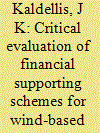| Srl | Item |
| 1 |
ID:
149841


|
|
|
|
|
| Summary/Abstract |
For many Small Island Developing States (SIDS) the cost of producing electricity from imported fossil fuels is so high and the cost of renewable energy technology has fallen so significantly that transitioning towards renewable energy is likely to produce cost savings. A recent workshop at NYU School of Law, which brought together SIDS utility representatives with a leading renewable energy developer and other stakeholders, provided strong support for this prediction. Utilities are likely to own the majority of renewable energy assets in SIDS and will therefore be the initial custodians of any cost savings renewable energy provides. This raises a key policy question: to what extent should SIDS utilities pass on these savings to consumers by lowering electricity rates? We analyze this overlooked element of energy policy and highlight undesirable consequences that complete disbursement of the savings to consumers could cause.
|
|
|
|
|
|
|
|
|
|
|
|
|
|
|
|
| 2 |
ID:
104912


|
|
|
|
|
| Publication |
2011.
|
| Summary/Abstract |
After a long stagnating period during the second half of the 1990s, the market of wind energy in Greece was described by remarkable but unstable growth rates that resulted in the operation of 1 GW of wind power by the end of 2009. Still though, penetration of wind energy is not the one anticipated. On the other hand, national targets regarding the Renewable Energy Sources' (RES) contribution and existence of excellent wind potential areas across Greece challenge new wind energy investments. Acknowledging the unsteady development rates of wind power in Greece, efficiency of the State support mechanisms is currently investigated. Based on an analytical evaluation model, the investigation undertaken is extended to provide a detailed cost-benefit analysis of several wind energy case studies, including mainland and island applications as well as comparison with both conventional power stations and photovoltaic plants. For this purpose, the financial support provided by the State is directly compared with benefits accruing from the operation of wind parks, considering also the avoidance of social costs deriving from thermal power stations. Based on the results obtained, the beneficial characteristics of wind energy applications for the Greek society are clearly demonstrated, especially in the case of non-interconnected island grids.
|
|
|
|
|
|
|
|
|
|
|
|
|
|
|
|
| 3 |
ID:
124504


|
|
|
|
|
| Publication |
2013.
|
| Summary/Abstract |
The European electricity market is linked to a carbon market with a fixed cap that limits greenhouse gas emissions. At the same time, a number of energy efficiency policy instruments in the EU aim at reducing the electricity consumption. This article explores the interactions between the EU's carbon market on the one hand and instruments specifically targeted towards energy end-use efficiency on the other hand. Our theoretical analysis shows how electricity demand reduction triggered by energy efficiency policy instruments affects the emission trading scheme. Without adjustments of the fixed cap, decreasing electricity demand (relative to business-as-usual) reduces the carbon price without reducing total emissions. With lower carbon prices, costly low emission processes will be substituted by cheaper high emitting processes. Possible electricity and carbon price effects of electricity demand reduction scenarios under various carbon caps are quantified with a long-term electricity market simulation model. The results show that electricity efficiency policies allow for a significant reduction of the carbon cap. Compared to the 2005 emission level, 30% emission reductions can be achieved by 2020 within the emission trading scheme with similar or even lower costs for the industrial sector than were expected when the cap was initially set for a 21% emission reduction.
|
|
|
|
|
|
|
|
|
|
|
|
|
|
|
|